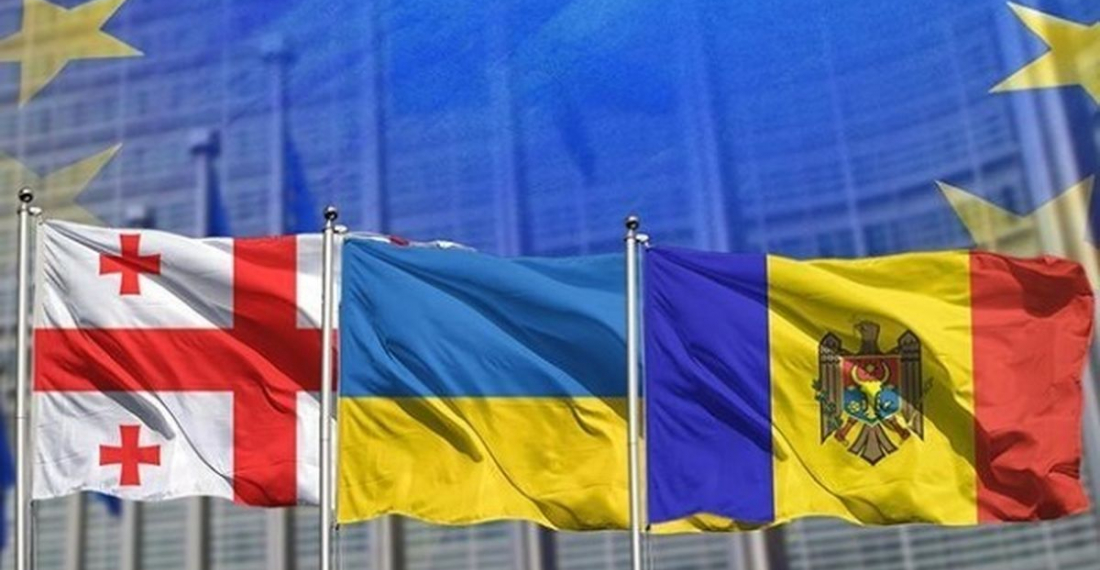Today, the European Commission presented its Opinions on the application for EU membership submitted by Ukraine, Georgia and the Republic of Moldova as invited by the Council. Today's Opinions are based on the Commission's assessment in light of the three sets of criteria to join the EU agreed by the European Council: political criteria, economic criteria and the ability of the country to assume the obligations of EU membership (EU acquis). The Opinions also take into account Ukraine, Moldova and Georgia's efforts in implementing their obligations under the Association Agreements (AA), including the Deep and Comprehensive Free Trade Areas (DCFTA), which cover significant parts of the EU acquis.
The European Commission has found that Ukraine overall is well advanced in reaching the stability of institutions guaranteeing democracy, the rule of law, human rights and respect for and protection of minorities; has continued its strong macro-economic record, demonstrating a noteworthy resilience with macroeconomic and financial stability, while needing to continue ambitious structural economic reforms; and has gradually approximated to substantial elements of the EU acquis in many areas.
On this basis, the Commission recommends that Ukraine be given the perspective to become a member of the European Union. It should be granted candidate status on the understanding that steps are taken in a number of areas.
As regards Moldova, the European Commission concludes that the country has a solid foundation in place to reach the stability of institutions guaranteeing democracy, the rule of law, human rights and respect for and protection of minorities; macroeconomic policies have been reasonably sound and progress has been made in strengthening the financial sector and business environment but key economic reforms remain to be undertaken; the country has established a solid basis to further alignment with the EU acquis.
On this basis, the Commission recommends that Moldova be given the perspective to become a member of the European Union. It should be granted candidate status on the understanding that steps are taken in a number of areas.
The European Commission assesses that Georgia has a foundation in place to reach the stability of institutions guaranteeing democracy, the rule of law, human rights and respect for and protection of minorities, even if recent developments have undermined the country's progress; it has achieved a good degree of macroeconomic stability and has a sound record of economic policy and a favourable business environment, but further reforms are needed to improve the functioning of its market economy; and overall, Georgia has established a solid basis for further alignment with the EU acquis.
On this basis, the Commission recommends that Georgia be given the perspective to become a member of the European Union. It should be granted candidate status once a number of priorities have been addressed.
Ursula von der Leyen, President of the European Commission, said: “Ukraine, Moldova and Georgia share the strong and legitimate aspiration of joining the European Union. Today, we are sending them a clear signal of support in their aspirations, even as they face challenging circumstances. And we do so standing firm on our European values and standards, setting out the path they need to follow in order to join the EU. The Commission's opinions mark an inflection point in our relations. Indeed, this is a historic day for the people of Ukraine, Moldova and Georgia. We are confirming that they belong, in due time, in the European Union. The next steps are now in the hands of our Member States.”
Olivér Várhelyi, Commissioner for Neighbourhood and Enlargement, said: “We have worked quickly and efficiently to be able to present our opinions in record time. We expect member states to take forward decisions in the coming days, but our partner countries should already start working to deliver on their side on the key reforms outlined in our recommendation. This is crucial in order for Ukraine, Moldova and Georgia to move ahead on their EU path.”
Next steps
Based on the European Commission's Opinions, the EU Member States will now have to decide unanimously on the next steps.
The applications for EU membership by Ukraine, Georgia and Moldova in light of the Commission's Opinions will be discussed at the next European Council on 23 and 24 June. In the meantime, the EU remains committed to continue to further strengthen ties and deepen their partnership to support Ukraine, Moldova and Georgia, in line with our Association Agreements and Deep and Comprehensive Free Trade Areas.
source: commonspace.eu with the press service of the European Commission.






